If you’re desperately looking for information on how to survive the first 48 hours with a new puppy, you’ve come to the right place. After all the puppy-proofing is done, all the necessary supplies stocked up on, all that’s left is to patiently wait for Gotcha Day and hope all goes smoothly.
Whether you’re a first-time or an experienced dog owner, you probably know that the first night with a new puppy can be tough. Although it’s an exciting time, it’s a huge step and commitment for you and your family. Similarly, your new puppy will likely feel stressed and confused, since they’ve just left their very first home and their already familiar littermates and mama. To help you navigate through the first night with a new puppy, we’ve put together a list of recommendations and tips that will surely make any new puppy owner’s life a bit easier. Let’s dive in!
Table of Contents
- First Night With A New Puppy: How Do You Survive The First 48 Hours With A New Puppy?
- Tips For Your Puppy To Adjust To Their New Home – First 48 Hours With A New Puppy
First Night With A New Puppy: How Do You Survive The First 48 Hours With A New Puppy?
So, it’s the first night with a new puppy. What should I do the first night with a new puppy? Are the first two weeks with a puppy the hardest? What should you expect? How should you be prepared? All of these are completely normal questions that any responsible (future) puppy parent likely has tried to find answers to.
The first 48 hours with a new puppy and even the first week with a new puppy is likely going to be a bit stressful. Naturally, you’ll be worried if your little pup gets well adjusted to its new home. It’s not uncommon for new dog owners to worry if they’re doing everything they can to help with the adjustment period. But, as you are here reading this article, it’s safe to say that you’re on the right track of making the first night with your new puppy as easy and manageable as you possibly can.
Likewise, it’s not just smooth sailing for you either, as you’ll be adjusting to a new situation and getting to know your new little family member. During the first 48 hours with a new puppy, we recommend you stay home, so you can spend as much time as possible bonding with your little companion. If possible, work from home or take a few days off to help your new puppy adjust to its forever home. Surely, you both will value this one-on-one time and bonding experience.
Additionally, from the first night with a new puppy you should create a calm and quiet environment in your home. Not only will this greatly reduce stress and overstimulation by sounds and sights, your puppy will need lots of rest and sleep in a supportive environment. After all, they’re still just babies.
At the end of the day, try to remain as calm and patient as possible, as this is going to be a huge life change for both you and your new pooch. It’s completely normal for a puppy to be confused, scared, and anxious when arriving to a whole new environment, away from everything they’ve known so far. And if you’re well prepared in advance, the first 48 hours with a new puppy will go by so fast, you won’t even remember all that hassle.
So, now that we’ve covered the basics, let’s go over the most important things to keep in mind during the first night with a new puppy.
Tips For Your Puppy To Adjust To Their New Home – First 48 Hours With A New Puppy
Behavioral & Training
It might seem a bit harsh at first, but you should be committed to training and enforcing good behavior from the moment you bring your new puppy home. Your puppy starts developing behavioral habits from the start. So, it only makes sense to introduce the rules and routines from the first night with a new puppy. In fact, by starting training as early as possible, a puppy will feel a much higher sense of security and build their confidence along the way.
What’s more, if you’ve adopted your puppy from a reputable breeder, it’s likely that they’ve already started with puppy training in the breeding facility. You’ll just have to continue the training routine and advance as appropriate by your puppy’s age.
Keep in mind that it’s much easier to set routines and enforce good behavior than it is to change bad behavior. Allowing a puppy to get away with unwanted behavior, or giving your puppy special attention in response to bad behavior, will indeed condition them to continue doing so. To discourage bad behavior, say ‘no’ in a sharp voice and distract the puppy from unwanted behaviors.
Positive Reinforcement & Respect
Of course, you should only use positive reinforcement and never scold your puppy for unwanted behavior. You should enforce rules and good behaviors with respect and gentle affection. In addition to that, don’t forget to praise your puppy for good behavior with attention and some yummy treats.
In addition to that, you should always remember that your puppy is not a toy. Puppies and dogs should always be treated with respect. They have their own personalities, their own desires, and each of them is unique. You shouldn’t forcefully restrain your pup nor should you force them to interact with someone they don’t like. Instead, invite your puppy to an interaction. If they accept, handle your pup in a gentle and respectful manner. If they decline the invitation, their refusal should be respected as well.
Don’t Forget Your Own Behavior
Lastly, the key to influencing your dog’s behavior is by paying attention to your own behaviors and habits. It’s not uncommon for dog owners to unknowingly reward bad behaviors. As a result, a puppy will learn that even bad behaviors will get rewarded and they’ll continue to behave this way. Pay close attention to what actions you’re rewarding, work hard to control your own responses and impulses, and you’ll end up with a well-behaved and well-rounded dog.
Feeding & Water
Setting a routine is just as important with mealtimes. Puppies are typically brought home between 6 to 10 weeks old. During that time, you should feed your puppy small portions 3 to 4 times a day. Set regular mealtimes for your puppy from the day you bring them home. It’s usually easiest to schedule the puppy’s mealtimes around the same time you have your meals. For example, breakfast, lunch, and dinner. It’s also a great time to socialize with the family when everyone’s having their meals at the same time.
Here’s a generalized puppy feeding guide by age:
| Age | Portions | Frequency |
| 8-12 Weeks | Small Portions | 3-4 times/day |
| 4-5 Months | Puppy Food | 3 times/day |
| 6-8 Months | Puppy Food | 2 times/day |
| 9-11 Months | Adult Food | 2 times/day |
| 1-2+ Years | Adult Food | 2 times/day |
Moreover, your breeder will probably recommend that you continue feeding your new puppy the same brand of food that they have been giving. If you prefer to switch brands, keep in mind to do it gradually over time. Both puppies and adult dogs have sensitive stomachs, so changing the formula at once can trigger stomach problems like diarrhea and vomiting.
We do recommend that you only feed your puppy high quality dog food formulas that are specially designed for puppies. Although there’s a vast selection of dog foods out there, not all of them are created equally. To help you narrow down the selection, here’s our guide on the best puppy food formulas that dog owners swear by. Moreover, consult with your breeder and/or veterinarian about the best options for your puppy.
But how much should you feed your puppy? Below is a useful puppy feeding chart, so you can calculate their daily caloric intake based on how much they’ll weight once grown up:
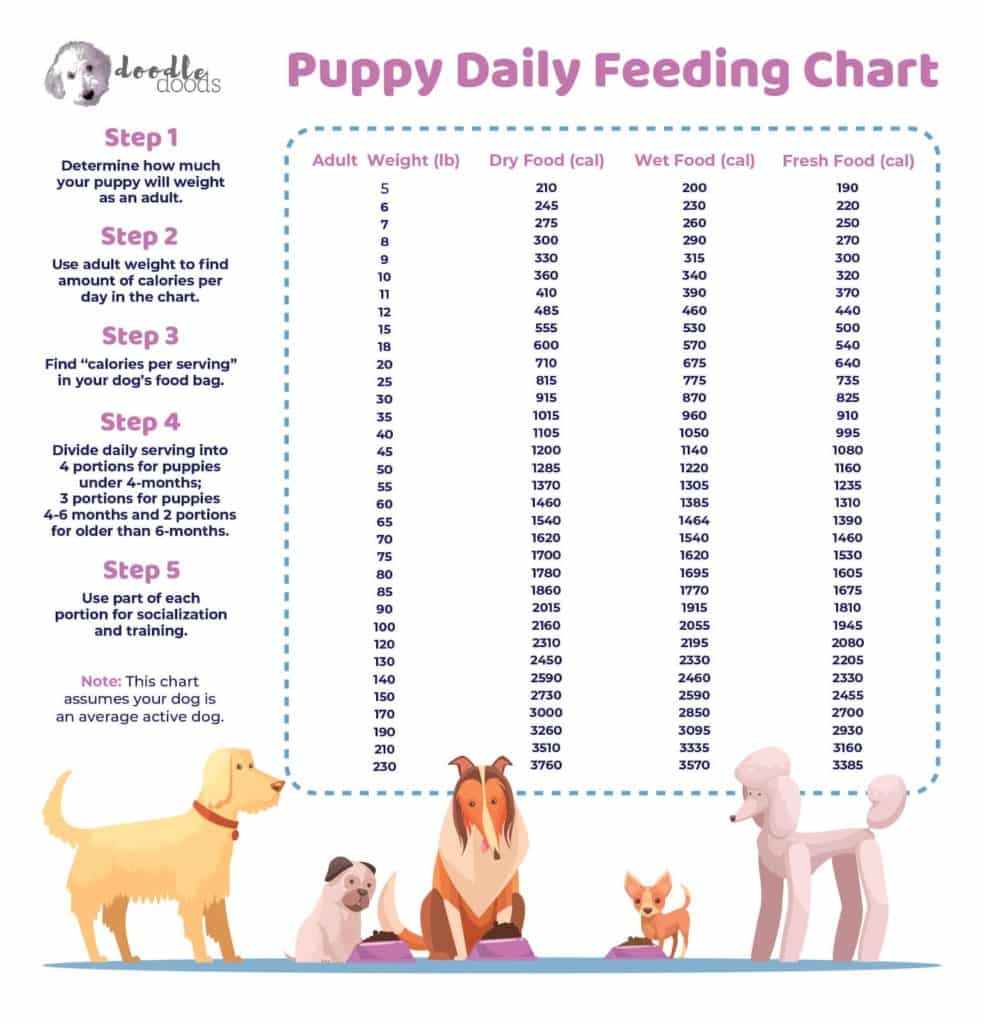
Be sure to use our dog food calculator every so often to determine how much food your puppy needs as he grows!
Water Intake
Even though mealtimes should preferably be at the same time each day, the same logic doesn’t apply to drinking water. Puppies need unrestricted access to water at all times. You can limit it as much by providing water first thing in the morning and until about an hour or two before bedtime. Limiting water intake before bedtime will also help limit your puppy’s need to go to the bathroom at night.
On the other hand, sometimes puppies can become a bit too excited around a full bowl of water. Some pups find them to be fun swimming pools, which will create perpetual wet mess on your floor. Other puppies will drink too much at a time, causing loose stools or making it impossible to become potty trained. To avoid these scenarios, you can put less water in the bowl and fill it whenever it gets empty. In addition to that, you might want to mix some water into their kibble or wet food, so they’ll get the necessary hydration, but don’t overdo it.
For the puppies who like to use their water bowl as a swimming pool, this bowl does wonders to prevent that.
Where Should A Puppy Sleep The First Night?
The first night with your new puppy will likely be the most difficult time period. However, rest assured that your puppy will adjust in a matter of a few weeks. Now, it might be tempting to bring your new little pup into your bed for the night. However, we (and most dog behaviorists out there) strongly advise against it. There’s nothing better than snuggling up to a small baby dog when falling asleep, but it will be so much more difficult to wean them from sleeping in your bed later on.
Set a Routine and Stick To It
Firstly, establish a good sleeping routine from the first night with a new puppy. As we mentioned before, you should start with training and setting routines as soon as you bring your new puppy home. Set a time and stick to it. You might want to tire out the puppy before bedtime with a little playtime or walkies. On the other hand, although puppies do sleep a lot (some puppies can even sleep up to 20 hours in a day!), they’ll most likely ask for a potty break in between their nightly naps. For this reason, you should be prepared for some sleepless nights for the first couple of weeks…just like with a human baby.
Prepare A Comfy Bed
Secondly, before the first night with a new puppy, you should prepare them a cushy and comfy crate beside your bed or in your bedroom. They’ll feel much safer and more secure knowing that you’re close by. If you don’t want your dog to sleep in the bedroom in the future, it’s best not to let them stay in the bedroom past the third night. In addition to that, you’ll want to place a toy or blanket smelling like their mother and littermates inside the crate. This will ease and calm your puppy.
The first 48 hours with a new puppy are going to be stressful for both of you, that’s just a fact. But crating them for short periods of time during the day and for longer naps during nighttime is going to make your new puppy feel much more at ease. Likewise, it’s going to make the adjustment period that much easier for you as well.
Lastly, be prepared for whining and crying for the first few nights or weeks. It’s only natural that your new puppy misses its mama and littermates, but they’ll soon adjust to their new home. You can place your hand inside the crate, if the whining gets too bad. Additionally, your pup might be signaling you that they need to go, so you may want to take them out for a quick potty break.
Many pet parents swear by the Snuggle Puppy for calming their new puppy, especially at night.
Potty Training
As puppies are technically still babies, you can expect them to use the bathroom at least every waking hour. A general rule of thumb is that puppies need to eliminate after mealtimes, drinking, playing, when they wake up, and before they go to bed in the evening.
On the first night with a new puppy, introduce them to their potty area. Breeders might be able to provide some kind of material that already has your puppy’s smell. You can place this where you would like your puppy to go to the bathroom. In the beginning, you might need to pick up the puppy and carry them to the bathroom area yourself.
Additionally, keep in mind that house training your puppy will likely take several months. Some puppies learn it a bit faster, some a bit slower. But that’s completely normal! Remember to never punish your puppy for accidents around the house, as they’re still learning how to ‘use the bathroom’. Always reward your puppy with positive vocalizations and maybe even a treat after they go potty.
Adjusting With Other Pets
For the first 48 hours with a new puppy, it might be reasonable to give your new family member a calm and quiet environment away from other pets in the household. Once your new puppy has had a bit of time to explore and adjust, you can start introducing them to other pets in your family.
If you have an adult dog, you’ll want to make sure that they know how to behave around the puppy. Calmly introduce them to one another in a safe space. If the adult dog is beginning to become agitated, separate the dogs immediately and try again later when both pups have calmed down.
In case you have a cat, you’ll want to make sure that the cat has an escape route away from the puppy. Cats can just as easily become anxious, so it’s important you give your other beloved pet the space it needs to relax.
What Should I Do The First Night With A New Puppy?
So, as we’ve established by now, the first night with a new puppy likely won’t be all smooth sailing. Yes, they’re the cutest thing you’ve ever seen and you can’t fault your new pup for anything. Nonetheless, you should establish rules and boundaries from the moment you bring your new puppy home. For instance, if you let them do something one time, they’re going to be confused as to why it’s not allowed next time.
Get Prepared!
First and foremost, you should be properly prepared for your new puppy’s arrival. The first night with a new puppy is not going to be easy. And if you’re not well prepared, it’s going to be that much more difficult and stressful. Make sure you have all the necessary items for your pup, including:
- A crate and/or a dog bed. You should also have them already placed in the area where your puppy will be sleeping.
- Bedding and puppy blankets
- Food and water bowls
- Puppy food
- Collar and leash
- Puppy toys and chew toys
- Puppy treats
- Pet gates
- Poop bags
- Cleaning supplies
In addition to that, you should also properly puppy proof your home *before* your new puppy arrives. This will help avoid any unfortunate accidents and prevent your new puppy from getting overstimulated.
Things To Do On The First Night With A New Puppy
So, what should I do the first night with a new puppy? We recommend you follow the guidelines we discussed earlier in this guide, including:
- Establish a proper routine for your puppy and stick to it. This should include set mealtimes, bedtime, and potty breaks.
- Make sure your home is as calm and quiet as possible. Don’t have any friends coming over and avoid making loud noises.
- Let your new puppy inspect the home under your supervision so that they have an easier time getting adjusted to their new environment. Puppy proof areas where they shouldn’t go beforehand.
- Introduce them to their potty area as soon as you bring them home and take them there for each potty break.
- Be prepared for lots and lots of potty breaks for the first night with a new puppy!
- Introduce them to their crate so that they have their very own safe haven for that much needed R&R. We recommend placing a snuggly toy or a blanket with their mother’s and littermates’ scent in there as well.
- Establish boundaries and introduce your puppy to basic commands and accepted behaviors. Don’t forget to reward them for good behavior with tasty treats and lots of praise!
- Never scold or punish your puppy for misbehaving or leaving messy accidents behind. Remember – they’re essentially babies and they’re still learning everything!
First Night With A New Puppy: FAQ
It usually takes about three weeks for a puppy to get used to its new home. During that time, it’s crucial you provide your new puppy lots of care, attention, and affection. Likewise, you should set a routine and start training your puppy as soon as you bring them home, as this also helps your puppy to adjust to its new home and establish a sense of security and confidence.
We recommend your puppy sleeps in their designated crate in your bedroom on the first night. Place a stuffed toy like the Snuggle Puppy or a blanket with the mother’s and/or littermate’s scent inside the crate for some extra comfort. You can even place the crate next to your bed, so you can easily calm your pup by talking to them or by placing your hand inside the crate. Unless your goal is to have a dog who will sleep in your bed throughout its lifetime, it’s not a good idea to bring your new puppy to bed with you, no matter how much they cry at night.
For the first 24 hours, provide your new puppy a calm and quiet environment that they can explore and inspect (while supervised!). Schedule mealtimes, bedtimes, start potty training and crate training as soon as you bring them home. If your puppy is up for it, provide them lots of playtime, and of course, love and affection.
Indeed, the first weeks at home are going to be toughest on your puppy and you. Keep in mind that they’re adjusting to a new home environment and you’re basically a stranger to them! There’s also the matter of getting a hang of potty training, a proper sleeping schedule, and making sure that your new pup doesn’t develop any undesired behaviors. It might be tempting to let your new puppy do whatever they want, as you simply want to console them and make them feel less anxious about this huge life change. However, the best course of action is to start with training early on – this also helps with a puppy’s confidence, making them feel more secure in your home.
Final Thoughts
In conclusion, the first night with a new puppy is usually the toughest part, we’re not going to lie. The key is to enforce good boundaries, set schedules and routines, and provide your new puppy all the love, attention, and care it needs to adjust to its forever home. After a few days, you’ll notice that your new puppy is feeling more and more comfortable with their new family. We hope this article has given you a good idea about what to expect in the first days with a new puppy.
Learn How to Care for Your Doodle Puppy!
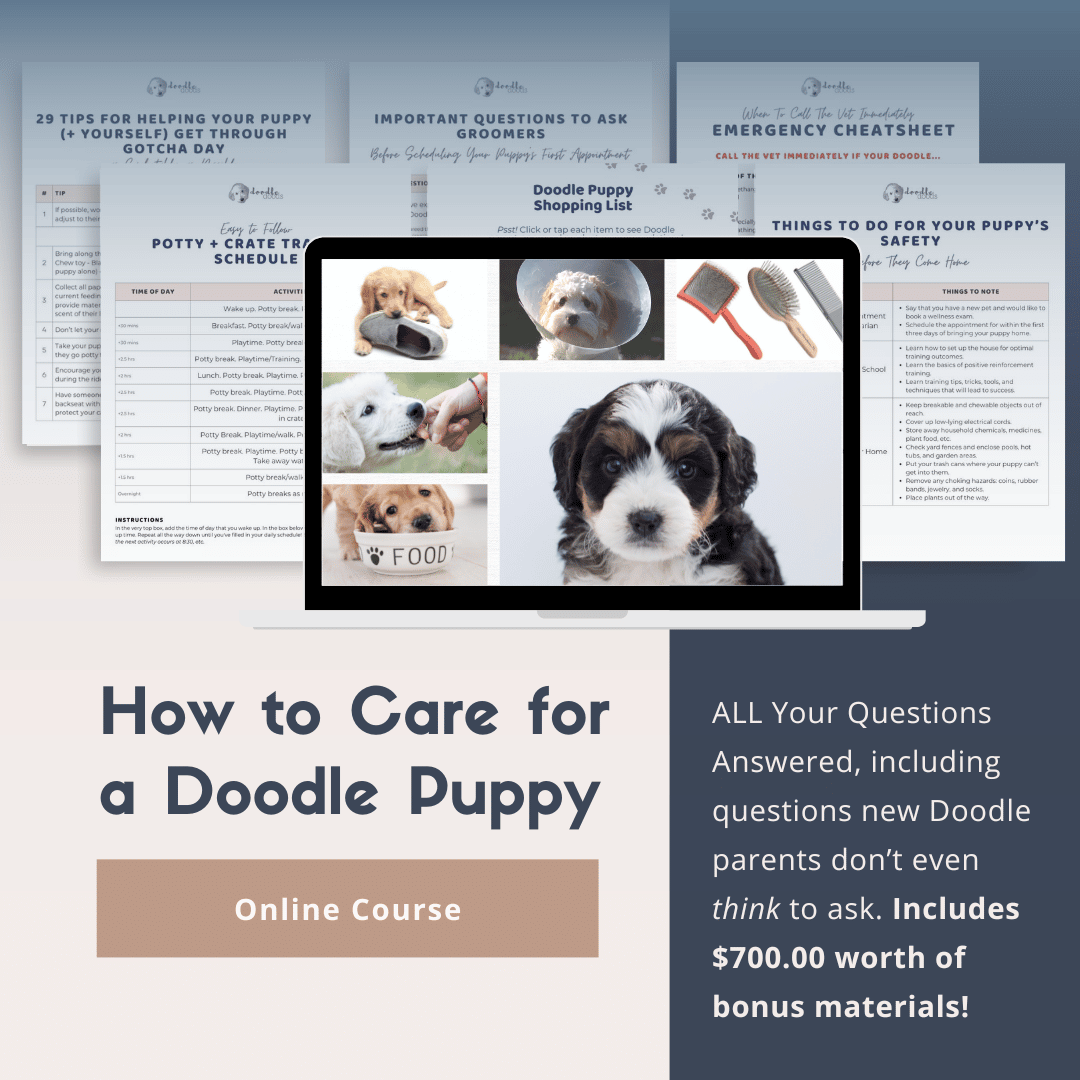
Perfect for first-time Doodle parents, get ALL your questions answered, including questions new Doodle parents don’t even think to ask.
Plus, get $700 worth of Bonus Materials for FREE, including:- Doodle Parenthood Community and Support Group ($190 value)
- Doodle Puppy Growth Tracker ($20 value)
- EMERGENCY Cheatsheet: When To Call The Vet Immediately ($50 value)
- HELP! Button ($145 value)
- And SO MUCH MORE!

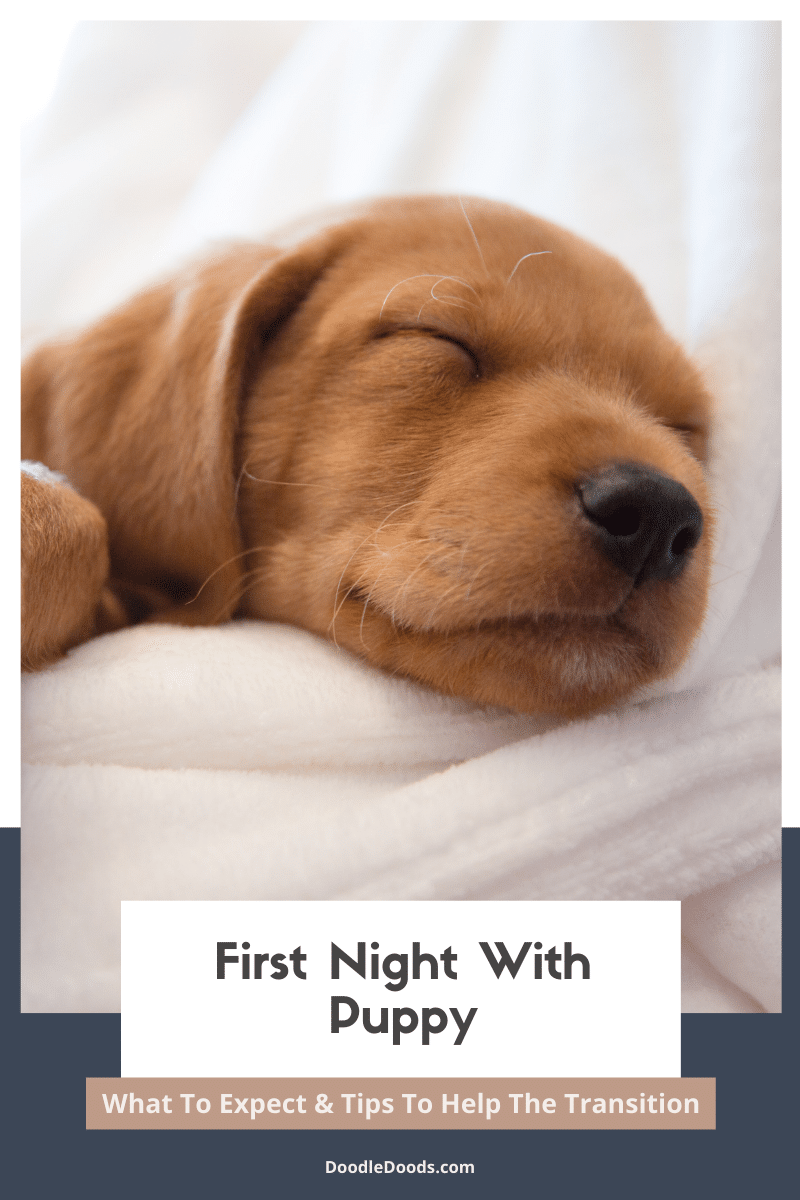

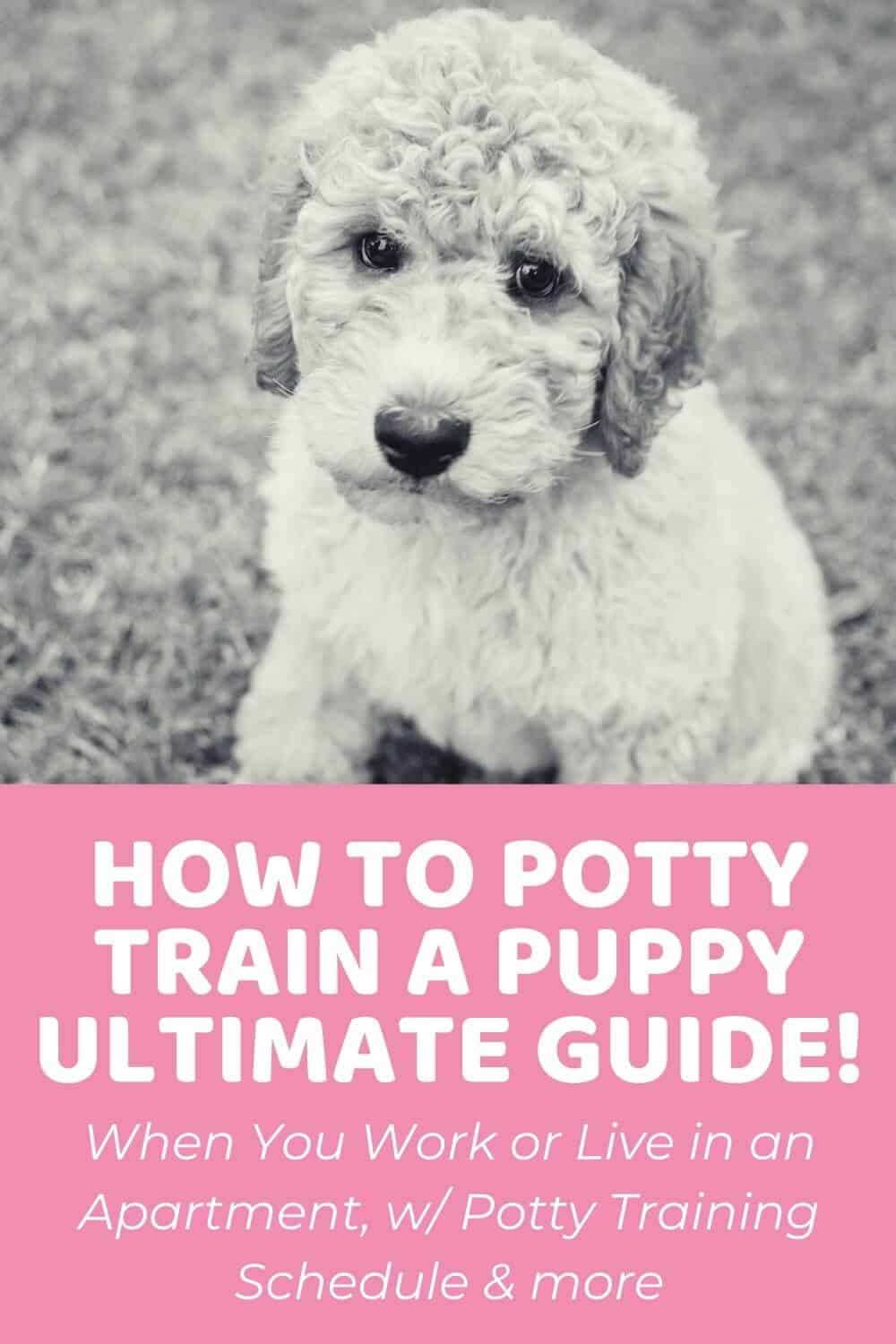

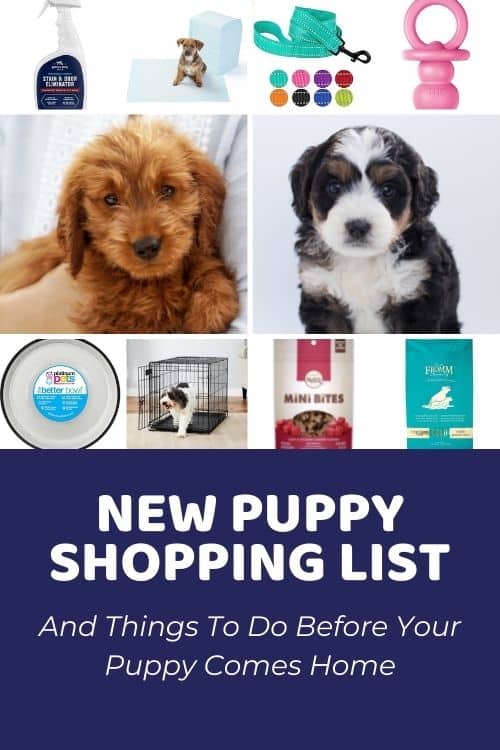

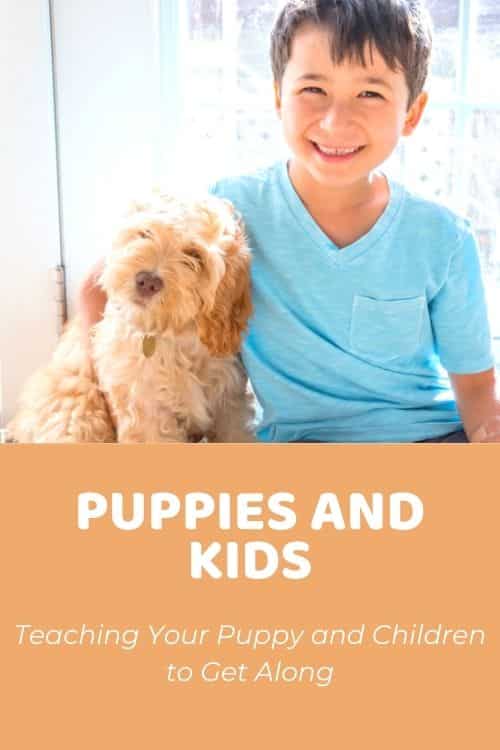



For all you established pet parents: what special (or challenging) memories do you have of the first day or week of bringing your pup home? Share with us in the comments below!